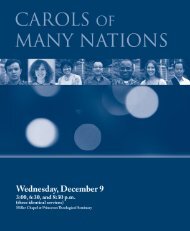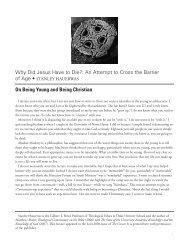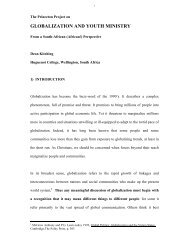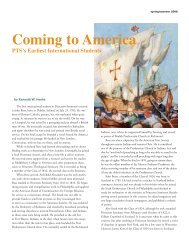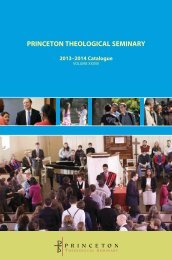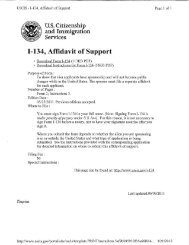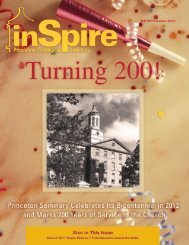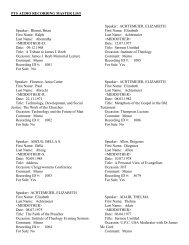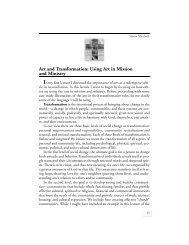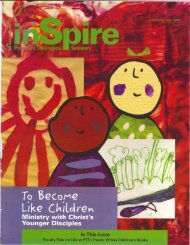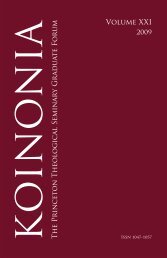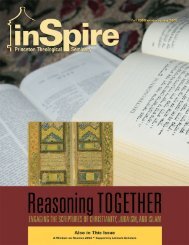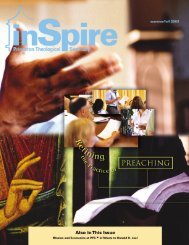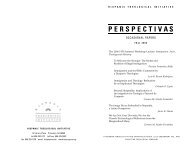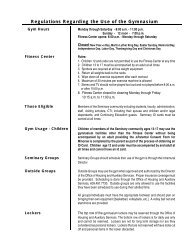Faculty - Princeton Theological Seminary
Faculty - Princeton Theological Seminary
Faculty - Princeton Theological Seminary
Create successful ePaper yourself
Turn your PDF publications into a flip-book with our unique Google optimized e-Paper software.
M.Div. and M.A. students are required to register for field education courses during<br />
each semester of participation, according to procedures that govern the selection<br />
of academic courses. A grade of P (pass) or F (fail) is recorded at the end of the<br />
course. One placement is full time in the summer (ten to twelve weeks) and the<br />
other takes place during the academic year (ten to fifteen hours per week). One<br />
must be in a church and one related to the student’s future vocation, which can<br />
be done in either a church or specialized ministry setting. Whenever possible the<br />
church responsibilities should include areas most germane to a student’s future<br />
ministry. Ordinarily each unit should be done in a different setting and not in the<br />
student’s home church.<br />
Placement Opportunities<br />
The <strong>Seminary</strong> attempts to locate suitable sites for its students, and is constantly<br />
updating its placement pool by establishing new sites and training new supervisors.<br />
All field education placements are done in approved sites under the direction<br />
of certified supervisors.<br />
<strong>Princeton</strong> <strong>Seminary</strong> has a remarkable location, and as a result, placements are<br />
available in sites drawn from a pool of seven hundred churches and specialized<br />
ministries. We work with twenty-eight different denominations, located in rural,<br />
suburban, and inner-city settings. Specialized ministries include prisons, health<br />
institutions, community service agencies, campus and teaching ministries, and<br />
ministry with persons with special needs.<br />
Clinical pastoral education opportunities may be used to satisfy one field education<br />
unit. These placements are also located in urban, rural, and suburban areas<br />
within commuting distance from the <strong>Seminary</strong> during the academic year, and in<br />
more than thirty different states around the country in the summer. Funding is the<br />
student’s responsibility.<br />
The Field Education Office also provides opportunities for cross-cultural, racial/<br />
ethnic, and international placements in areas of Africa, Asia, Europe, the Caribbean,<br />
and Latin and South America. There are several special opportunities for placements<br />
focused on ecumenical work, on teaching, and on urban ministry, particularly<br />
in the summer program in Trenton.<br />
Student Advisement System<br />
Upon entering the <strong>Seminary</strong>, each M.Div., M.A., and dual-degree student is<br />
assigned a field education adviser. Students are required to have two meetings<br />
per year with their adviser: the first one in October to discuss their call and general<br />
objectives in field education; the second one in January-February to focus on the<br />
type of field education placements they would like to pursue. Whenever possible,<br />
students are placed in settings of their own denomination. All programs for M.Div.,<br />
M.A., and dual-degree students must be planned with the approval of their field<br />
education advisor and secured by April 1.<br />
e 168 f<br />
cat0809



